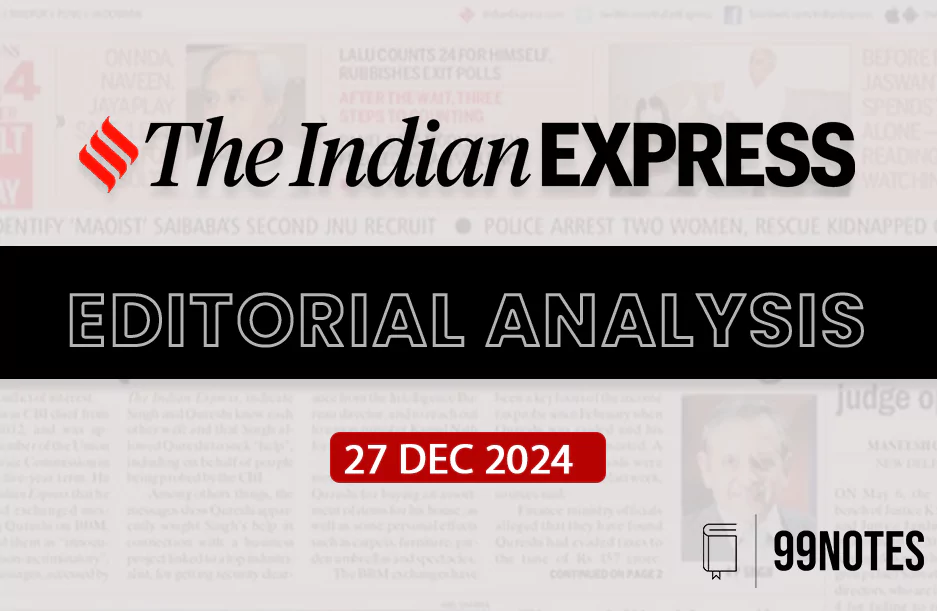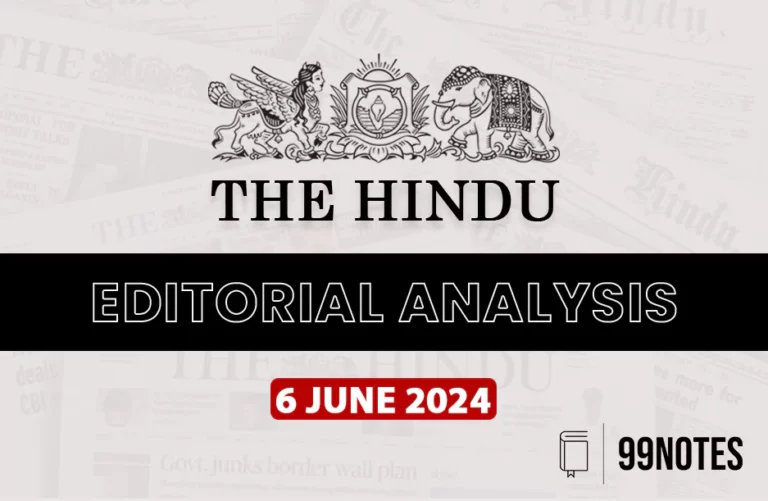27 December 2024 : Indian Express Editorial Analysis
1. Taxing the rich more will reduce inequality
(Source: Indian Express; Section: The Ideas Page; Page: 15)
| Topic: GS2 – Governance
GS3 – Indian Economy |
| Context |
| ● The article highlights the urgent need for progressive fiscal reforms in India, including fair taxation of the super-rich, to address extreme inequality, boost public spending, and ensure sustainable development. |
Public Spending and Socioeconomic Rights in India
- India’s public spending remains significantly below the level required to guarantee essential social and economic rights for its population.
- Despite decades of robust economic growth, large sections of the population still lack access to basic needs such as nutritious food, quality healthcare, education, and adequate housing.
- Infrastructure for amenities like fuel and electricity also remains inadequate.
- Furthermore, critical public investments needed to mitigate the effects of climate change and facilitate a green transition are alarmingly insufficient.
- This deficit in public expenditure highlights systemic challenges that hinder equitable development and undermine the realization of fundamental rights.
Rising Inequality and Its Economic Impacts
- India has emerged as one of the most unequal countries globally, with stark disparities in income and asset distribution.
- Research by the World Inequality Lab reveals that most GDP gains in recent decades have been concentrated among the wealthiest 10%, exacerbating wealth accumulation at the top.
- Such extreme inequality has not spurred economic dynamism or productivity but has instead led to stagnating mass consumption demand, dampening private investment.
- Social and political divisions have deepened as a result, further destabilizing the country.
- Moreover, attempts to mask poverty levels through manipulated indices and data have only obscured the need for urgent reforms.
Fiscal Policy Challenges and the Need for Progressivity
- Addressing India’s socioeconomic inequalities and public spending deficits necessitates a fundamental shift in fiscal policy.
- The country’s tax-to-GDP ratio is among the lowest in the G20 and relies heavily on regressive taxation methods.
- Indirect taxes disproportionately burden the poor and middle class while the wealthy, who have benefited most from recent growth, remain undertaxed.
- A progressive fiscal framework that increases government revenue without exacerbating inequality is essential to achieving sustainable development and social equity.
Taxing the Super-Rich: A Global Movement
- A pivotal step in addressing inequality and boosting public revenue is ensuring the fair taxation of ultra-high-net-worth individuals (UHNWIs).
- The G20’s Rio Summit endorsed international cooperation to effectively tax the super-rich, recognizing their ability to exploit loopholes and shift assets to tax havens.
- A proposed global minimum wealth tax of 2% for billionaires, suggested by economist Gabriel Zucman, could serve as a model.
- Such a tax could be complemented by reforms in income and wealth taxation, potentially extending to centimillionaires.
- This framework ensures that wealth held abroad is effectively taxed, reducing incentives for evasion.
Feasibility and Misconceptions About Wealth Taxation
- Critics argue that wealth taxation in India is administratively challenging or could deter investment by the wealthy.
- However, advancements in digitization and international agreements on financial transparency have significantly improved the feasibility of tracking assets and wealth.
- Countries like Colombia tax wealth irrespective of its location, while nations like the US and France impose exit taxes on individuals relocating to evade taxes.
- These examples demonstrate that fair taxation of the rich is both practical and enforceable, even in developing economies like India.
The Imperative for Fair Taxation
- Implementing equitable taxation for India’s wealthiest citizens is a critical step toward reducing economic inequalities and generating much-needed government revenue.
- Increased revenue can support essential public spending on health, education, and climate resilience, thereby fostering a more equitable society.
- The Narendra Modi government faces an urgent moral and economic imperative to pursue this path.
- With the necessary tools and precedents in place, there is no justification for delaying such reforms. Fair taxation is not only feasible but essential for India’s sustainable and inclusive growth.
| Practice Question: Discuss the implications of inadequate public spending and rising economic inequality in India. How can progressive fiscal reforms, including fair taxation of the super-rich, address these challenges while ensuring sustainable development? (250 words/15 m) |
For more such UPSC related Current Affairs, Check Out: 26 December 2024 : Indian Express Editorial Analysis




